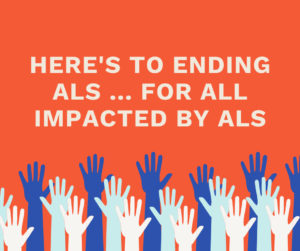I AM ALS is here to drive change. It’s part of our ethos to revolutionize how to cure disease, with our sights set on ALS. We believe the best way to do this is providing those directly impacted the opportunity to drive progress.
Progress in our eyes, however, has not been made to ensure we’re doing this for everyone impacted by ALS. There is a lack of inclusivity and equity within the ALS community. Black people are more likely to go undiagnosed or experience longer delays to being diagnosed with ALS and are underrepresented in the community of champions driving progress.
I AM ALS is committed to intentionally addressing the gaps of inclusion and equity in the ALS community. While we can acknowledge there is a lot of work to do, we are here to take the first steps to address these gaps and ensure all people impacted by ALS have the opportunity to receive care and be a part of the revolution.
Over the course of the past year, the staff at I AM ALS has come together on a weekly basis to explore the barriers to equity for Black and Indigenous People of Color (BIPOC). We formed the internal Solidarity Learning Collaborative with two main goals. First, we wanted to educate ourselves on the roots and experiences of racial injustices within the United States and the healthcare system. Second, we wanted to take action to address these injustices and ensure I AM ALS and the ALS community are inclusive and equitable. The bottom of this page shares some of the resources we’ve been exploring.
We know this is just a start and that we still have a lot of listening and learning to do. We also know we cannot work toward inclusivity and equity without the voices of Black and Indigenous People of Color impacted by ALS. Starting this February and going forward, we will endeavor to change this.
As part of our efforts to be more inclusive, we will use our platform to first expand the reach and impact of Black stories and voices. We begin by focusing on Black people because of the documented health disparities and barriers to care that they face.
We aim to create a safe space for Black people with ALS, caregivers and loved ones to connect and share their stories. We commit to listening and learning, and using the knowledge we gain to develop strategies for improving the ALS landscape to work better for everyone impacted by ALS. The listening session will only be open to those who identify as Black and impacted by ALS in order to build trust and craft an environment where people feel comfortable speaking freely about their experiences.
We additionally will have Black advocates take over our social platforms not just for a moment in time around recognized holidays but on a recurring basis.
As a community-centric platform — these are our developing plans and we expect, as always, for the community to hold us accountable as we work to create a more equitable and inclusive movement for all.
Here’s to ending ALS … for all impacted by this disease.
Here’s what we’ve read, watched and listened to:
- All Our Kin by Carol Stacks
- The Dig’s Organize to Win with Andres Celin and Rapheal Randall
- Y’all Tryna Win or Nah?! by Youth United for Change
- “They Want us Sick” in Butch Queens Up in Pumps Gender, Performance, and Ballroom Culture in Detroit by Marlon M. Bailey
- “The Past is Ever Present: Recognizing the New Racism” in Black Sexual Politics by Patricia Hill Collins
- The Case for Reparations by Ta-Nehisi Coates
- Removing Obstacles To Eliminating Racial And Ethnic Disparities by Margarita Alegría, Kiara Alvarez, Rachel Zack Ishikawa, Karissa DiMarzio and Samantha McPeck
- Minorities, men, and unmarried amyotrophic lateral sclerosis patients are more likely to die in an acute care facility by Stephen A Goutman, MD, Dustin G Nowacek, MD, James F Burke, MD, Kevin A Kerber, MD, Lesli E Skolarus, MD and Brian C Callaghan, MD
- Hundreds of Days of Action as a Start to Address Hundreds of Years of Inequity by Maulik Joshi, PhD
- Screening for Unmet Social Needs: Patient Engagement or Alienation? by Elena Butler, AB, Anna Morgan, MD, MSc, MSHP & Shreya Kangovi, MD, MS
- The ‘truth’ about ALS: Reconciling bias, motives, and etiological gaps by Chelsey Carter
- The Racial Thinking behind ALS Diagnosis by Chelsey Carter
- Removing Obstacles To Eliminating Racial And Ethnic Disparities In Behavioral Health Care by Margarita Alegría, Kiara Alvarez, Rachel Zack Ishikawa, Karissa DiMarzio, and Samantha McPeck
- Health Disparities and Health Omissions: Pushing Medical Anthropology Forward in the United States by Chelsey Carter
- HBCUs’ Impact on Diversity in Healthcare Workers on The HBCU Career Center by Taneia Surles
- #BINW22 – NeuroRacism Panel “Disparities in Neuroscience” from Black In Neuro Week 2022

